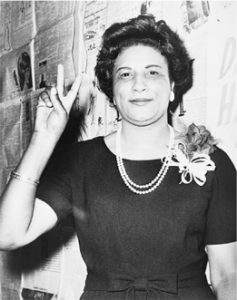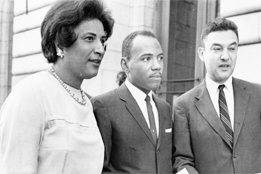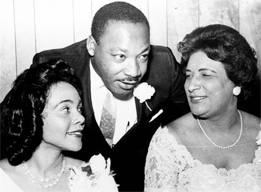
Sojourner’s Truth Staff
The GOP and the country at large has had no problems with the nigh all-white male history of domination on the highest court in the land. For white males, such a place of power and privilege is seen as their birth right due to white skin privileges, but to allow a Black woman to sit on the highest court in the land, well, that just sets them off with chattering a lot of gibberish.
The GOP continues to demean and diminish the Black woman as being intellectually inferior and is utterly incapable of telling the difference between a law book and a J. Crew catalog…such was the commentary from Louisiana senator, John Kennedy.
When it is time for the confirmation hearings by the Senate of the Black woman nominee, it will be telling to the watching public as to whether she receives the same cordial and laudatory treatment that was accorded Amy Coney Barrett, the most recent white Supreme Court pick.
White America has never embraced the Black woman as being an intellectual equal but
their viewpoint of her has been soiled by concocted imagery of her being a welfare queen or a wanton sexpot or the Butterfly McQueen (Gone With The Wind) image of a loyal mammy.
Of course, those GOP haters would not debate a Black woman on such an issue and much less any of the proposed picks that Biden has in mind. Simply to say that any one of those possible contenders would run intellectual circles around their GOP detractors but since those intellectual bullies speak from the protected air of the congressional halls, they are not concerned with backing up their Neanderthal statements.
Why is it that none of those carping GOP haters ever questioned why the court has been packed with white males since its inception to current date and much less the lower federal district and appellate courts?
Did you ever see any of the GOP membership (or Democrats for that matter) champion the cause of a Black woman on the court? Of course not. Seeing a Black woman as a person and as a person of value who could hold their own on the court was never a consideration for white America. – Lafe Tolliver, February 9, 2002, The Truth

As our intrepid columnist pointed out last week, never in this nation’s nearly two and a half centuries of existence has a Black woman been in consideration for a seat on the highest court in the land. Sen. Kennedy and those of his ilk would have the nation believe that such consideration should be unlikely because of the affinity of Black women for a J Crew catalog.
Yet, believe it or not, Senator, there have been, and are, some pretty outstanding Black female attorneys in this country’s history – not the least of whom was Constance Baker Motley.
She was the first black woman to graduate from Columbia Law School (in 1946); first black woman (second woman) to work at the NAACP as a lawyer; first black woman to argue a case before the U.S. Supreme Court (in 1961 and from 1961 to 1963 she won nine of 10 cases there); first woman elected to the New York Senate in 1964; first woman elected Manhattan Borough president in 1965; first black woman appointed a federal judge, first woman to serve as chief judge of the Southern District of New York.
Constance Baker Motley, often overlooked, always underreported, was present for and responsible for so many critical events in the long-time Civil Rights struggle that consumed the African-American community during the 1940s, 1050s and 1960s.
As a young lawyer working for the NAACP, starting in 1946, she worked hand-in-hand with Thurgood Marshall, particularly on the landmark Brown vs. Board of Education. In fact, Motley wrote the first legal complaint in the case and spent the rest of the 1950s working on case after case in federal courts attacking laws and practices that supported white supremacy.
In the 1960s that dedication paid off as she won case after case and as the Lyndon John presidency shepherded in law after law dismantling segregation.
Born in 1921, in New Haven, Connecticut, to parents who were immigrants from the Caribbean island of Nevis, Constance Baker was the ninth of 12 children. Her mother was a domestic servant and her father a chef, working for various Yale University student societies. Her mother, a community activist, founded the New Haven NAACP.
After high school, Motley started college at Fisk University but transferred to New York University after one year. She graduated with a Bachelor of Arts degree in economics in 1943. Motley received her Bachelor of Laws in 1946 from Columbia Law School. Thurgood Marshall hired her as a law clerk for the NAACP during her second year at Columbia. And she joined the NAACP full time after Columbia.
As a front-line lawyer for the NAACP Legal Defense and Educational Fund, Motley personally led the litigation that integrated the Universities of Georgia, Alabama, and Mississippi among others—overcoming Southern governors who literally barred the door to African American students. Her most famous case was serving as the attorney for James Meredith, the first black student admitted to the University of Mississippi.
 By the time she left the NAACP Legal Defense and Educational Fund in 1965, Motley had personally argued 10 Supreme Court cases (winning nine, including the Meredith case). The tenth decision, regarding jury composition, was later reversed in her favor. She also assisted in nearly 60 cases that reached the high court.
By the time she left the NAACP Legal Defense and Educational Fund in 1965, Motley had personally argued 10 Supreme Court cases (winning nine, including the Meredith case). The tenth decision, regarding jury composition, was later reversed in her favor. She also assisted in nearly 60 cases that reached the high court.
Along the way, she experienced numerous courtroom delays and indignities. Motley kept her cool, even when some judges turned their backs when she spoke.
She opened up schools and parks to African Americans, and successfully championed the rights of minorities to protest peacefully.
Given the time of her service for the benefit of so many Americans, working alongside the esteemed Thurgood Marshall, the first African American appointed to the U.S. Supreme Court and often serving as counsel for the now-celebrated Martin Luther King, Jr, her accomplishments are often overlooked and her legacy has receded with time.
In Simple Justice, which had long been considered the definitive history of the Brown case, the author Richard Kluger mentions Motley on only four of 778 pages calling her “pleasant, taciturn Connie Motley.”
And while her legal accomplishments, as advocate and as judge, would have made her supremely qualified for consideration to the highest bench in the land, any such consideration of Black women for such a position during her time was a nonstarter. In fact, any such consideration for women in general until the early 1980s was not a possibility. That is, until Ronald Reagan declared during his campaign that he would place a woman on the Supreme Court.
Imagine a president declaring that he would correct a longtime slight to a specific group!
Nevertheless, she has been honored by those who have taken the time and effort to study those accomplishments.
In 1993, Motley was inducted in the National Women’s Hall of Fame and in 2001, President Bill Clinton presented her with the Presidential Citizens Medal. The NAACP awarded her with the organization’s highest honor, the Spingarn Medal, in 2003.
Motley remained chief justice of the Southern District Court of New York until her death in 2005.

